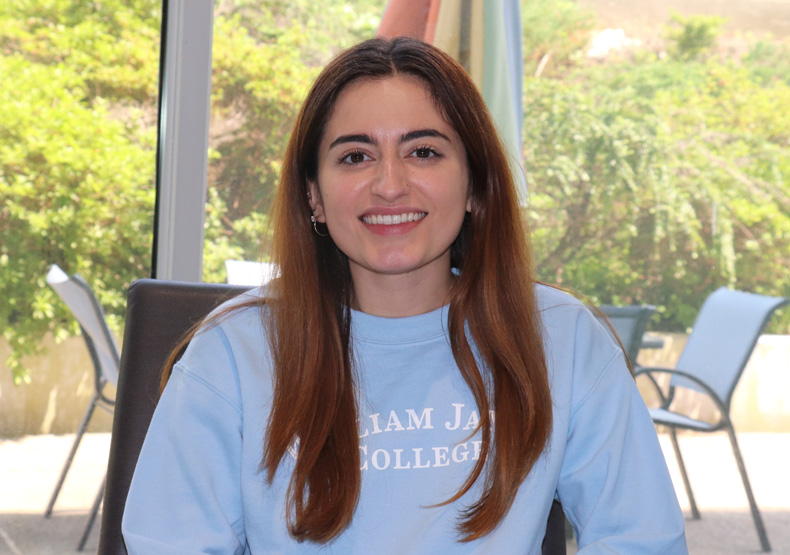Rhode Island Native Pursues Mental Health Counseling Career with William James College's Online Program

For residents of Rhode Island, earning a Master of Arts in Clinical Mental Health Counseling from William James College is now more accessible than ever—thanks to a low-residency, online option to pursue licensure as a mental health counselor.
Isabella Neves, who grew up in Lincoln and now resides in Warwick, learned about the three-year program following her graduation from the University of Hartford. After earning her BS with a concentration in health science, and gaining acceptance into the Doctor of Physical Therapy program at UHart, she deferred admission for a year in order to collect her thoughts and earn some money.
“I fully intended to become a physical therapist,” says Neves whose pivot from working as a receptionist at a construction company to becoming an activities therapist at Butler Hospital in Providence—the only private, nonprofit psychiatric and substance abuse hospital serving adults, seniors, and adolescents in Rhode Island and southeastern Massachusetts—led to a change of heart and plans.
“I was reminded of my passion for the psychology and human development classes I took while an undergrad and decided to dip my toes into the field,” says Neves who, during her time working with at-risk youth on the inpatient adolescent unit, began researching online programs with a hybrid option to become a licensed mental health counselor (LMHC).
“The opportunity to attend clinical seminars live on Zoom, coupled with being face-to-face with classmates during the summer residencies, really stuck out to me,” says Neves of her decision to enroll at William James College in one of five online graduate degree programs currently offered. (Other courses in the program are offered asynchronously). Her proximity to campus, just an hour away, was another big draw.
“I couldn’t really afford to quit my job, so this low-residency program was a great fit,” says Neves, who enjoys the flexibility needed to work part-time while being a full-time student. She also qualifies for the Behavioral Health Initiative Scholarship, an incentive that offers tuition reduction at a variable rate (24% for the 2023-24 academic year) for MA in Clinical Mental Health Counseling students who are working in the field while attending school with plans to complete their chosen program in three years.
Neves will begin her third and final year in August which includes an internship of her choosing with support from the William James College Field Education Office—at Bryant University in Smithfield—where she will assume her own supervised caseload of clients via the University’s Counseling Services. Neves admits that juggling school, work, and a field placement can be a challenge. “I live by my planner and have learned to schedule things in advance as well as ensure I have enough alone time to recharge,” she explains of a load that is difficult at times. Still, the many benefits fuel her.
“I really like that I am able to work with, and positively impact others from communities in Rhode Island,” says Neves. In her time at Butler, Neves has enjoyed the chance to connect with other young people who grew up and attended high school in Rhode Island—some of whom danced at the same studio she did and even had the same teachers at Lincoln High School. At times, youth with whom she has worked will approach her in public just to say hi or rekindle a previous connection—an added benefit of living and working in the same community she calls home.
“My parents taught me the importance of connection, empathy, and caring for others,” says Neves, an only child, whose mother’s work as a kindergarten teacher influenced her to want to work with adolescents. Despite knowing her parents did the best they could, Neves acknowledges that, while an adolescent herself, she would have benefited from the support of a trusted adult outside of her immediate family.
“I never felt comfortable enough to tell anyone [I was gay] and wish I felt safe enough to seek out a therapist where I could share all my concerns and feelings,” says Neves who struggled with anxiety while growing up and lacked coping mechanisms to deal with it. Statistics show that LGBTQIA+ youth experience more anxiety and depression than their straight peers, and the numbers increase exponentially among kids who identify as trans and/or nonbinary.
“I know what it’s like to struggle and not receive the support needed,” says Neves who is passionate about giving young people—like those she regularly meets at Butler—a chance to work through, and beyond, their challenges. For most, this includes having a trauma history, living in the foster care system, and identifying with the LGBTQIA+ population—the field in which Neves hopes to eventually specialize.
In a world rife with bullying (which has only been exacerbated by social media), Neves is more driven than ever to become part of the solution. Through her online program at William James College, she is gaining the fundamental knowledge needed to support people as they grow through personal challenges, work to establish healthier relationships, and seek self-understanding. Once licensed, Neve will be positioned to serve more people and make a greater difference than working on the front lines without a graduate degree—a career path she’s thankful for.
“Once I'm licensed, I'll be able to have my own clients, do out-patient work and eventually specialize in LGBTQIA+ youth. More empowering than offering support, I want to give [young people] the tools to help themselves.”
- Tags:
- In the Community
Topics/Tags
Follow William James College
Media Contact
- Katie O'Hare
- Senior Director of Marketing
- katie_ohare@williamjames.edu
- 617-564-9389
